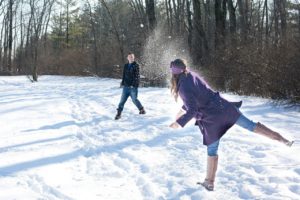
Contributed by Megan Wilson, BS, CADC, Timberline Knolls Residential Center
The holidays can be a stressful time for anyone, especially those who are recovering from alcoholism. If someone you love is early in recovery, you may be uncertain of ways to support their recovery from alcoholism during the holidays.
How to Support a Loved One in Recovery From Alcoholism During the Holidays
First, you can directly ask them what they need as support. Support often means different things to different people and it would be helpful to find out if there is a specific statement or gesture that would assist them during the holidays. If they appear to be struggling, they may prefer to be reminded “I’m here if you need to talk” versus being asked “What’s wrong?”
Additionally, you will be reaching out to the individual to let them know you do care about their recovery and it gives them an opportunity to advocate for themselves. Those in recovery are reminded that they cannot do this alone, and by reaching out, you can demonstrate your willingness to be a member of their support network.
Be mindful. Your loved one may not want to discuss their experience in treatment or their recovery. Engage them in light-hearted conversations and respect their boundaries. When and if they are ready to discuss their recovery with you, they will let you know.
Remember that although their disease of addiction had taken over their life, it does not exclusively define them nor does it have to be the center of all conversations.
Alcoholism and Reestablishing a Relationship
While early in recovery, individuals are re-connecting with themselves and exploring their identities outside of their addictive lifestyle. Talk about their interests; this can be an exciting time of trying new activities to enjoy while sober. This may be an opportunity to get ideas of future plans to create positive experiences with one another.
 In addition to respecting their decision of discussing their recovery, also be aware that they may decide against attending your holiday party or may leave early. Understand that sobriety and recovery become the first and utmost priority.
In addition to respecting their decision of discussing their recovery, also be aware that they may decide against attending your holiday party or may leave early. Understand that sobriety and recovery become the first and utmost priority.
If they feel as though your party may be serving alcohol or that someone they previously drank with will be in attendance, they may decide that they need to be in a different environment. They may also leave early if they feel as though their recovery will be jeopardized.
Those who are early in recovery are encouraged to leave situations or to step outside to call their sponsor or another member of their support system when they are experiencing cravings. Consider providing an alcohol-free environment.
Understanding the Need for Support for Alcoholism During the Holidays
 Lastly, remember to reach out if you need support. Addiction is a family disease and it does not exclusively impact the individual struggling with alcohol. Al-Anon and Families Anonymous are 12 Step groups for family members of those who struggle with alcohol.
Lastly, remember to reach out if you need support. Addiction is a family disease and it does not exclusively impact the individual struggling with alcohol. Al-Anon and Families Anonymous are 12 Step groups for family members of those who struggle with alcohol.
By attending these meetings, you can also create your own support network of those who have similar experiences of addiction in their family. You cannot draw water from an empty well, so make sure that you are also taking care of yourself.
About the Author:

Megan Wilson, BS, CADC has been working at Timberline Knolls since 2013. She facilitates psycho-educational group therapy, completes substance use assessments, and takes on the leadership role of the Addictions Specialist team.
She also individually meets with residents to support a better understanding and application of 12-step recovery.
Thank you to Timberline Knolls for providing this article.
Timberline Knolls is a leading residential treatment center for women and adolescent girls, ages 12 and older, with eating disorders, substance abuse, trauma, mood and co-occurring disorders. Located in suburban Chicago, residents receive excellent clinical care from a highly trained professional staff on a picturesque 43-acre wooded campus. An adult partial hospitalization program (PHP) is also available in nearby Orland Park, Ill., for women to step down or direct admit. For more information on Timberline Knolls Residential Treatment Center, call 630-755-5173. We are also on Facebook – Timberline Knolls, LinkedIn – Timberline Knolls and Twitter – @TimberlineToday.
The opinions and views of our guest contributors are shared to provide a broad perspective of addictions. These are not necessarily the views of Addiction Hope, but an effort to offer a discussion of various issues by different concerned individuals.
We at Addiction Hope understand that addictions result from multiple physical, emotional, environmental, and genetic factors. If you or a loved one are suffering from an addiction, please know that there is hope for you, and seek immediate professional help.
Published on December 10, 2016
Reviewed and Updated by Jacquelyn Ekern, MS, LPC on January 12, 2021
Published on AddictionHope.com
